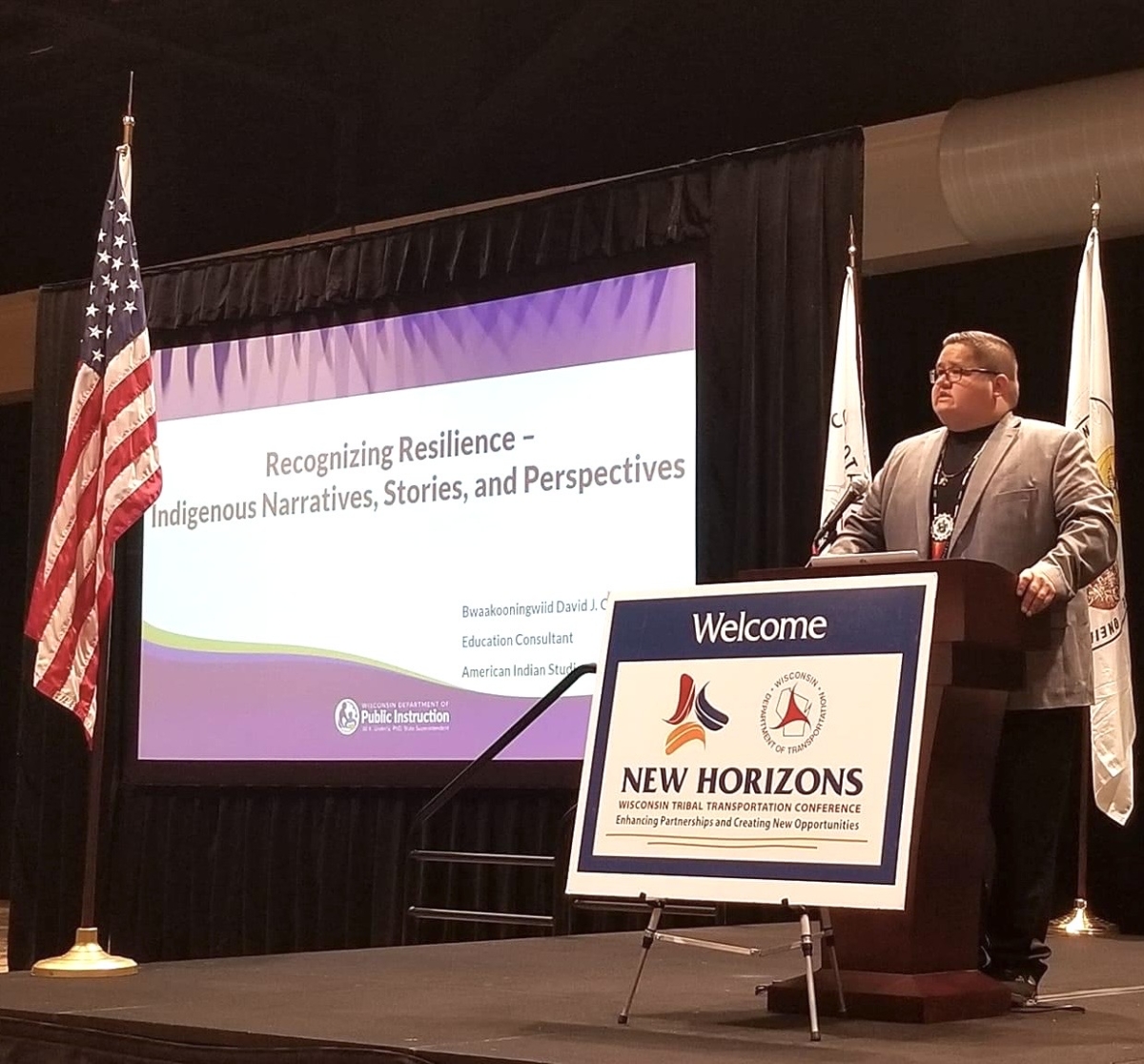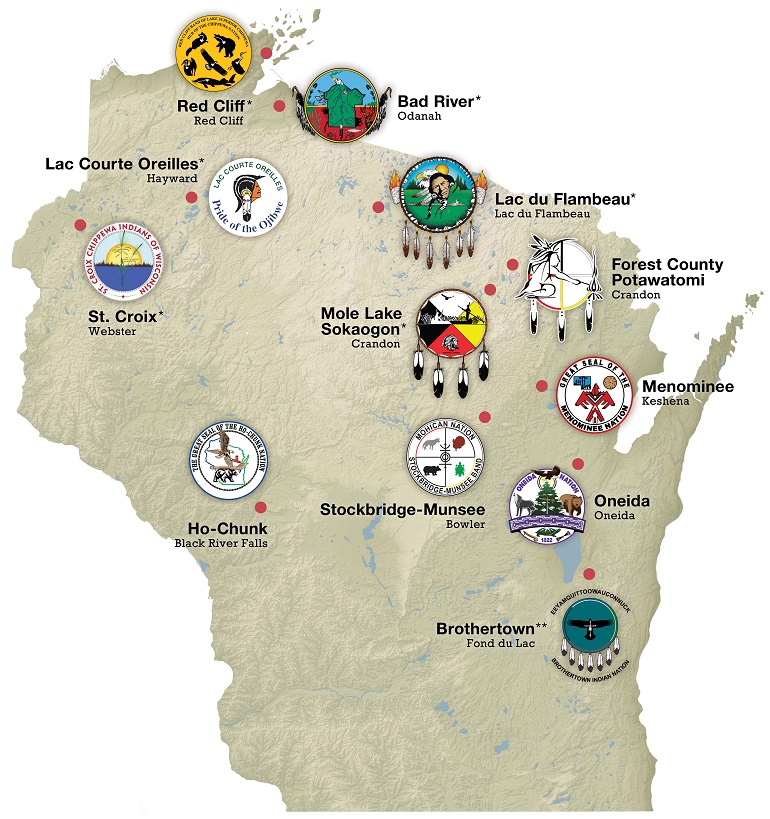
This article was written by David J. O'Connor, member of the Bad River Band of Lake Superior Chippewa ( Anishinaabe or Ojibwe), Education Consultant, American Indian Studies Program at the Wisconsin Department of Public Instruction, and Laura A. Roeker, Director of Teaching and Learning at the Wisconsin Department of Public Instruction.
Many educators across Wisconsin are familiar with land acknowledgments. Perhaps you have attended a training, conference or other professional development opportunity where the speaker begins their remarks by acknowledging the land they occupy as once belonging to Indigenous people. While land acknowledgments have become a common practice in educational spaces – as a means of honoring the sovereign people and nations who were forced to cede their ancestral lands – we must consider an important question: How can we move beyond simply acknowledging the land, water, and air, and into greater action and support?
What is a land acknowledgment?
Land acknowledgments are a practice of recognizing and honoring the Indigenous peoples, communities, and nations who have lived on and cared for the land since time immemorial before the arrival of European colonists and settlers. Land acknowledgments are seen as a way to acknowledge the history of colonization: forced removal of American Indian people from their lands; the genocide of Indigenous peoples, communities, and nations; and to recognize the continued ongoing struggles and issues that Native peoples face today.
Incorporating land acknowledgments into pre-K-12 and higher education settings can be an opportunity to help counteract the colonial narratives that have dominated westernized education and promote a more accurate, inclusive understanding of the world. Speaking a land acknowledgment in an educational setting increases the power of place – centering the Indigenous people and nations, histories, cultures, and traditions in the work.
While the use of land acknowledgments is a step in the larger process of decolonization and reconciliation, educational institutions must consider what action can be taken in tandem with land acknowledgments. Without action, land acknowledgments risk becoming empty, tokenistic, superficial gestures.
Land acknowledgements should be part of a greater effort to build partnerships, relationships, and understanding with Indigenous people, communities, and nations. This work requires ongoing education and engagement with the students, families, communities, and nations. The commitment by those using land acknowledgments should be to address the ongoing impacts of colonialism by utilizing the process of decolonization, ensuring we educators, students, and community members all learn about power structures and exercises of violence such as removal from lands, Indian boarding schools, historical trauma, and the ongoing dispossession of Indigenous lands and resources.
How can you pair action with land acknowledgments?
Moving beyond land acknowledgments requires taking conscious and concrete steps to support and elevate Indigenous people, communities, and nations. It requires us to work in ways that are accurate as well as authentic, while addressing the ongoing impacts of colonization.
Here are some ways educators, administrators, and educational institutions can pair action with Indigenous land acknowledgments:
- Provide accurate and authentic teaching and learning opportunities about Indigenous histories, cultures, treaties, tribal sovereignty and contemporary issues impacting Native people, communities, and nations. In these efforts, educators should take the time to educate themselves to better support students in their understanding of the ongoing impacts of colonialism. Teaching and learning opportunities about Indigenous peoples requires that educators acknowledge and work to resolve their own biases and stereotypes, understanding how these biases impact their teaching and learning. Reconciling one’s biases involves unpacking, unlearning, and relearning information before teaching students the content around Native American Studies.
- Representation matters. Carefully examine the depictions or portrayals of Indigenous peoples, communities, nations in your classrooms, schools, and other educational settings. This representation should include ensuring that bulletin boards, displays, flags of the First Nations, and instructional materials are displayed not just during Indigenous Peoples Day or Native American Heritage Month, but year round. Sharing and showing these resources promotes a feeling of community and inclusion that does not exist when these places of teaching and learning lack these relevant resources and materials.
- Research and support initiatives related to Indigenous education at local, national and international levels. Examples of these initiatives may include land-based education programs, language revitalization projects, and ongoing environmental protection efforts.
- Amplify and strengthen Indigenous voices, stories, perspectives, and narratives. In these efforts, share texts and digital resources written or created by Indigenous authors and scholars, share current articles from American Indian news and media sources, and listen to podcasts led by Native people to gain further knowledge about Indigenous perspectives and priorities.
- Recognize and support the need to develop and maintain ongoing relationships with Indigenous people, communities, and nations in your local area. Find and create opportunities to foster relationships with Indigenous people, communities, and organizations; work together to build mutual understanding and respect.
- Advocate for Indigenous rights and self-determination. Take action to support Indigenous land rights, treaties, and sovereignty. Consider supporting campaigns to protect Indigenous lands and resources, advocating for Indigenous-led climate solutions, and pushing for policy changes that address the ongoing impacts of colonialism in organizations. Take action in your own personal and professional life. Examine your relationship with the land, water, and air, and consider how you can live more sustainably. Work on reducing your ecological footprint; support local and sustainable food systems; respect food sovereignty; learn about the traditional practices of those who have lived and continue to live on the land where you reside and work.
The use of land acknowledgments can be an important first step in the work of reconciliation and decolonization. However, educators must make a genuine commitment to learn and engage with Indigenous peoples, communities, and nations and a recognition of their ongoing struggles for self-determination, social equity, justice, and their inherent sovereignty. We express our values not just by what we say, but what we do. These suggested opportunities will allow you to move beyond just including land, water, and air acknowledgments. Including intentional steps to infuse Indigenous studies into your everyday practices will help us move from acknowledgement to action.
Please visit each of the tribal nations of Wisconsin websites along with visiting the Wisconsin Department of Public Instruction - American Indian Studies Program and Wisconsin First Nations Education websites for resources and materials to incorporate First Nations Studies in practice.
We want to hear from you! Take the DPI Strategic Planning survey now!
